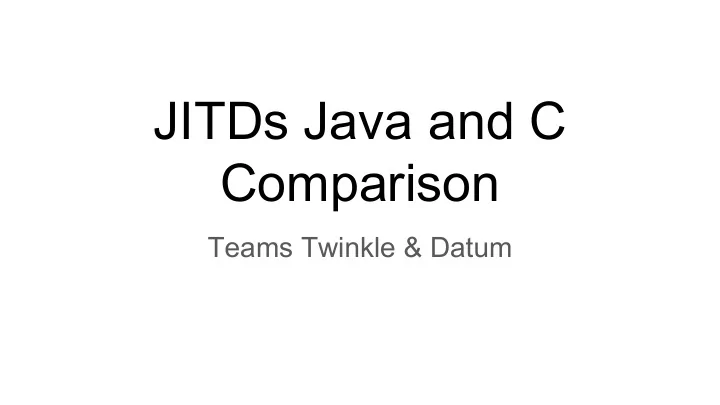

JITDs Java and C Comparison Teams Twinkle & Datum
Cogs in C
Cogs in C ● Basic struct which abstracts cogs based on type ● Acts sort of as an interface ● Each type of cog has its own basic structure ● Operations on cogs provided in header files - Cracking - Adaptive Merge - Related Operations/Etc. ● Memory management built into basic functions
Cogs in Java
Data in C ● Operation on data similarly provided in header files - Sort - Search - Min/Max - Iteration - Concatenate - Related Operations/Etc. ● Memory management built into basic functions
Delving deeper into C Data & Memory Management ● Main memory allocation happens on buffer creation/deletion ● There is some memory management done for helper structs such as iterators ● What is a buffer? - contains an array of data records [key/value pairs] - holds a reference count to itself - also contains a size value (number of records)
Cracking and Merging C vs Java Comparison ● Standard algorithm are used ● The implementations of cracking and merging is basically the same ● The only difference is that C uses structs and pointers ● C is proactive in memory management through the use of malloc and free ● Java uses the garbage collector for memory management
Single Read Comparison on Java vs C All tested 1000000 data key range 1000000 crack-1 single split at 500000 and crack and amerge are single split at 333333 and 666666: Java C crack-1 22.4407 ms 26.276 ms crack 24.426775 ms 36.057 ms merge 2730.864164 ms 4568.007 ms
Single Read Comparison on Java vs C
Cracking - C vs Java Tested with : Data: 1000000, Key Range: 1000000 Random Reads: 1000 Environment: Ubuntu 14.04 / CPU 1.7 GHz / Processor Intel i5
Adaptive Merging :(
Questions??
JITDs on Disk Team Warp Animesh, Archit, Rishabh, Rohit
CODE WRITTEN FOR Different FILE formats Data , Separator, Data Data,2,Data Null,5,Null Data,6,Data File Pointer, Separator, File Pointer File,2,File Null,5,Null File,6,File
Saving and restoring trees Considering memory constraints, previously we were only ● restoring a part of the entire index tree for further indexing based on the incoming query Also, saving that indexed sub-tree on the disk ● accordingly This introduced problems while merging partial trees ● together to create updated index structure
Paging Page-in and Page-out specific portions of the index tree ● based on the incoming query Each page will have a file structure similar to that of ● an index file
An Index Tree
An Index Tree With pages In memory logical representation P1 (Logical Representation) File,4,File Null,5,File P1 (Physical Representation)
Recommend
More recommend